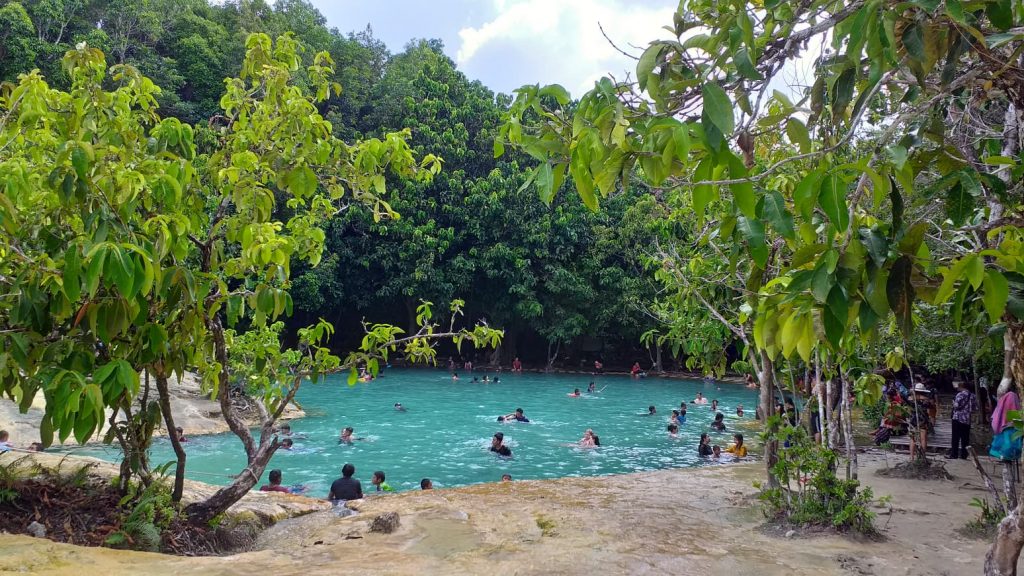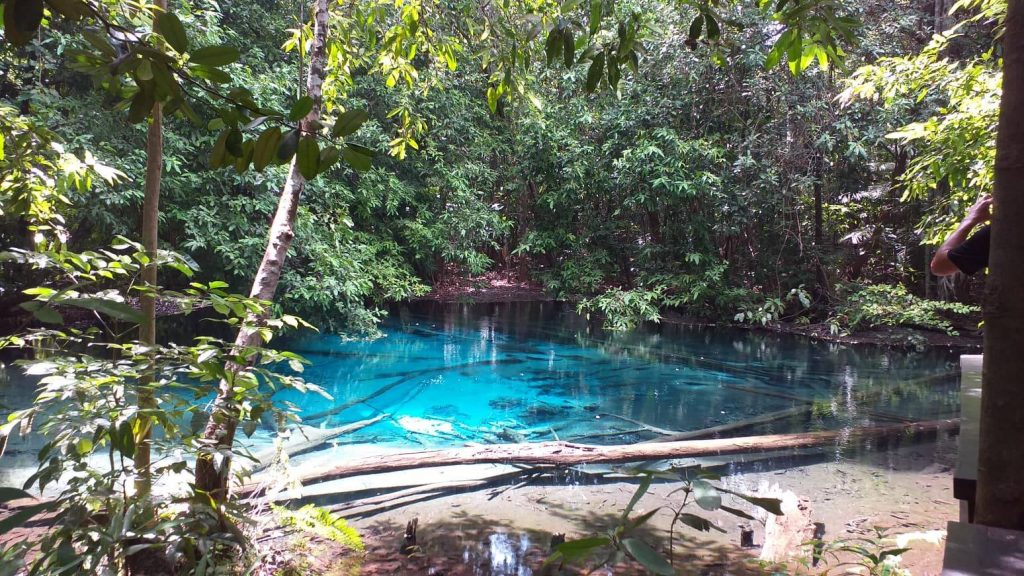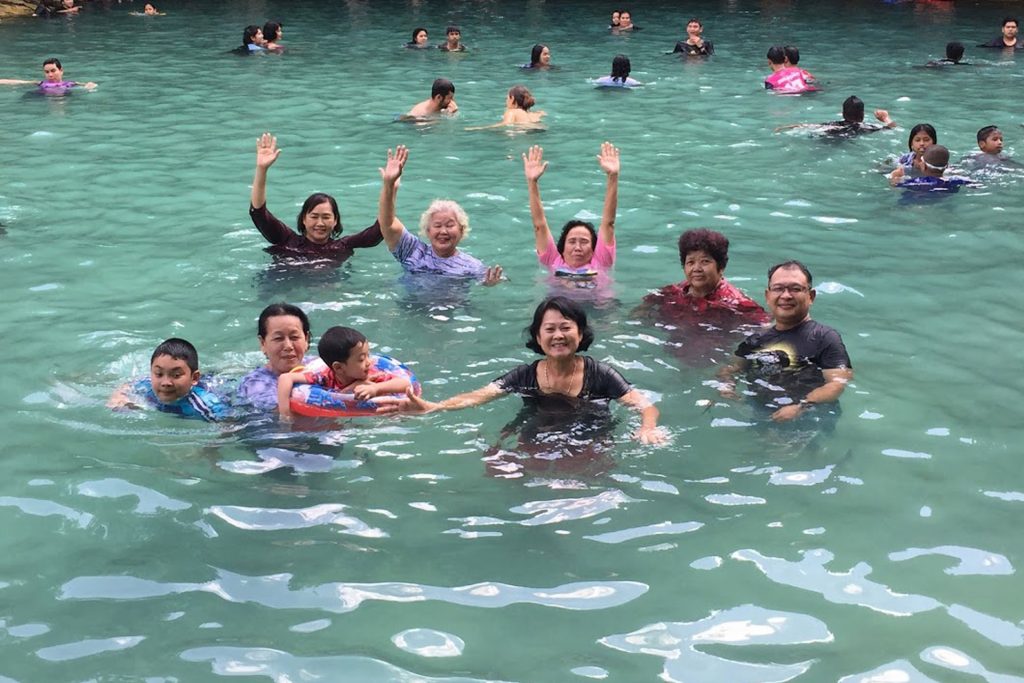This is one of our top suggestions for things you should do in Krabi, Thailand and the number one recommendation for enjoying the underground natural springs that flourish in Krabi province. The water is replenished by a natural streams running into the pool from freshwater sources on the hill above. Hot Springs Waterfall is another unique place with natural mineral water (30 – 40 degree) where everyone can swim and feel the real sanctuary of Rainforest Jungle.
Dip into the crystal waters of Krabi’s Emerald Pool, visit the Buddhist Tiger Cave Temple, hike uphill for stunning views, and explore a hot stream waterfall.
ou will be picked up from 7:30 AM – 7:45 AM. Please wait in your hotel lobby.
Start your journey with the Emerald Pool, locally known as Sra Morakot. Walk along the rainforest trail and cool off the heat of Krabi with a swim in this freshwater pool inside the Khao Phra Bang Khram Nature Reserve. Its green hue is a result of an abundance of minerals from the surroundings limestone hills.
Next, visit Krabi natural hot spring and its hot stream waterfall, Klong Thom Waterfall, located in the jungle 40km south of Krabi Town. Though the falls itself is just a cascade tumbling gently but a few meters, it is unique in that the spring water that feeds it bubbles up from the earth at temperature of 40° Celsius.
Enjoy lunch at a local restaurant before heading to Wat Tahm Suea, also known as the Tiger Cave Temple. Venture 1,200 steps up the hill for views of Krabi and its limestone rock formations.
Even the all-powerful Pointing has no control about the blind texts it is an almost unorthographic life One day however a small line of blind text by the name of Lorem Ipsum decided to leave for the far World of Grammar.
The Big Oxmox advised her not to do so, because there were thousands of bad Commas, wild Question Marks and devious Semikoli, but the Little Blind Text didn’t listen.
When she reached the first hills of the Italic Mountains, she had a last view back on the skyline of her hometown Bookmarksgrove, the headline of Alphabet Village and the subline of her own road, the Line Lane. Pityful a rethoric question ran over her cheek.
The Trip Cost Includes
- Pick-up or Drop-off service from and to Airport(in our own vehicle)
- Transportation to and from!!
- Food all along the trip(Breakfast, Lunch, Dinner and a cup of coffee or tea) and accommodations during the trip in hotels with family environment
- Transportation, food, accommodation and insurance of Guide during the trip
- Down jacket, all-season sleeping bag, duffel bag and trekking map(in case if you don’t have your own. Down jacket, sleeping bag and duffel bag must be returned after completion of the trip)
- First Aid Medical Kit(Your guide will carry the Medical Kit but we also advise to bring yourself for your own use, as far as possible)
- All the required permits and paperwork
The Trip Cost Excludes
- International Airfare
- Visa Charges
- Hotel Expenses(In Kathmandu, some packages do include hotel expenses)
- Your travel and medical insurance
- Personal Expenses such as shopping, bar bills, hot shower, telephone, laundry, titbits etc
- Food and accommodations in Kathmandu
- Services not mentioned or not promised by the agent/agency
- Emergency expenses such as expenses on chartered helicopter.
Frequently asked Questions
Annapurna Base Camp is a Grade B or a moderately difficult trekking route. So any fit person can do this trek, even if you do not have any previous experience. You should be aware of what to expect and mentally prepare for it. Then, as long as you will to, you can.
On average, you walk about 4 to 6 hours per day. One or two days can be as less as 3hrs and one or two days can be as long as 7hrs.
The highest altitude reached is 4190m. This is the elevation of Annapurna Base Camp. ABC is the highest we will climb in this trek.
Yes, you can charge batteries en route. Charger should be brought. There are hot shower facilities as well. You may have to pay certain amount for both ($1-$2). Negotiate. Also, hot water facility could be free at lower elevation.
No. There are no ATMs on this trek route. You will have to draw enough cash in Pokhara or Kathmandu. There are a number of ATMs in these cities. Everything is paid in Nepali rupees. So money should be exchanged before the start of the trek.
Yes. Internet can be accessed in most places. Sometimes, there might be some technical problems. Internet in Nepal is not as fast as you are used to and at times you can just lose connection.
Not really. It depends on you. If you want, ABC trekking can be done independently. You could hire a guide and a porter by yourself instead of going through an agency or not hire a guide at all. Although, not having a guide can be a little problematic during off season.
It really depends on you. Is it your first time in Nepal? How confident are you of being able to find your way around? How pressed on time are you? If you go through an agency, it will be costlier but everything will be planned. You will only have to come, trek and return.
For Annapurna region, pay for guides range from $20 to $30 per day and porters take $15 to $25 per day.




